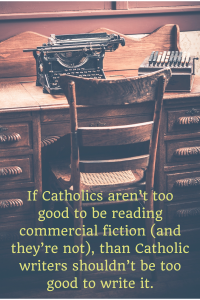I have the good fortune to be surrounded by educated people. People who love reading literature that is so heavy I shiver at the thought of slogging through it. Don’t get me wrong, I did my fair share of heavy reading and there were many times where I enjoyed it and found it moving. But for many people, myself included now, literature is a form of enjoyable escapism. And if reading is a serious chore, it’s hardly enjoyable.
Recently one of my friends, an unpublished writer who has publishable work (I know from having read it) recently admitted that he hasn’t pursued publication because he’s convinced his writing is not good enough.
I have dealt with this, I dare to say, peculiarly Catholic misconception for years. There exists a temptation to capitulate to pressure or shaming. That if we are going to write, it is not enough to write what we love. We must write something heavy, something ground-breaking and earth-shattering. It needs to be so deep the reader risks drowning in it, the concepts so immense and excellent that its worthy of being called a masterpiece of classical literature right from the get-go.
Otherwise, it’s not even worth publishing. It’s not good enough.
Not good enough for who? It seems like there is a certain amount of snobbery involved with this assumption that Catholics should only write “serious” literature. “Let’s leave the commercial fiction to those who don’t know any better.”
No. If Catholics aren’t too good to be reading commercial fiction (and they’re not), than Catholic writers shouldn’t be too good to write it. We shouldn’t be afraid to fulfill a need. We shouldn’t beat ourselves up at how we don’t stack up to Tolkien or Dickens (not that Dickens was Catholic). The truth is, there isn’t enough fair to good moral literature out there – not to mention the masterpiece that we stress ourselves out to produce.
Catholic readers of commercial fiction – and there are many – will just be relieved to find goodstories where they don’t have to worry about blasphemy, sketchy scenes that pop up out of nowhere, or gore.
For every Waugh, DeWohl, Benson, and Undset, there are countless other Catholics who wrote. Their impact, while unmemorable, nevertheless subtly influenced the minds of thousands of Catholics at the time. Why do we discredit them by saying that the only thing worthy of artistic endeavor is a masterpiece? What about all the stages in between? It is tantamount to expecting every portrait painter be a Michelangelo or throw down the paints altogether.
What is so shameful about commercial fiction? Granted, much commercial fiction can be dangerous. But commercial fiction sells because it does its first job well. It tells a good story.
That doesn’t mean it’s necessarily wrong – or, the more common misconception of many Catholic non-writers, that it’s easy.
It might not be a deep story. It might not be a complicated story. But it’s like watching a movie that you know will give you a few good hours of entertainment and that’s about it. You aren’t watching it for depth and soul-moving impact. You’re watching it for a simple pleasure. And so long as it’s moral, then it is perfectly acceptable to Catholic morality.
How much the better if it is from a Catholic context? Let’s not save the commercial fiction for the non-Catholics, because Catholics are reading it anyway. Let’s create a niche in commercial fiction, put a dent in it that has “Catholic” stamped all over it.
Why do Catholic writers need to write for a serious audience? Write what you love for readers like you and don’t be ashamed to embrace who you’re writing to. For that matter, it’s like being able to embrace yourself.
Catholics aren’t looking to read The Odyssey for their reading pleasure. They’re so hard up for literature, that after going through the classics (and sometimes not even that), they are skirting “the danger zone” of reading material in the search for a book to read.
Of course, any good priest would tell you that it’s entertainment. There’s no excuse for skirting danger. But that doesn’t take away from the fact that the allure is there. People want to be entertained. They want a good story. And even if your work isn’t the next Brother’s Karamazovor Heart of Darkness, it doesn’t matter.
Do the best you can, make it professional, and get it out there.
https://www.canva.com/design/DAA5MoL6opI/Pjzt6sNqN2qX2nRYOC682Q/view

Good post. I learn something new and challenging on blogs I stumbleupon every
day. It’s always exciting to read content from other writers and
use something from other web sites.
It’s always nice to hear that we don’t have to be writing the Next Big Thing to have an impact out there. Some of us are simply better suited to writing different sorts of stories.
In a similar vein, Catholic writer John C. Wright has a similar post up today: http://www.scifiwright.com/2014/09/your-book-of-gold/
I highly recommend reading it as well.
Thank you for this post!
Yes, on Koontz. I’m barely 50 pages into “Innocence” right now, and his writing is infused with a subtle respect for human dignity that is uncommon.
The poster boy of Catholic commercial fiction is Dean Koontz, who also just happens to be on be of the most prolific, successful, and popular writers in America. He hasn’t always made a big show in public of being Catholic, although he has done so since beginning his Odd Thomas series, but many readers have noted how uplifting and life-affirming his novels are. Considering that he writes suspense and paranormal, that’s quite an endorsement! It’s also a comment that few, if any, would make about his chief rival, Stephen King.
Koontz is proof that readers are hungry for a Catholic worldview in popular, commercial fiction.